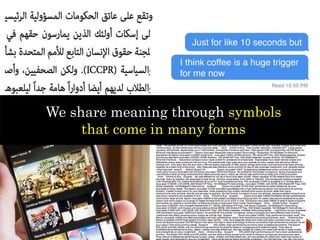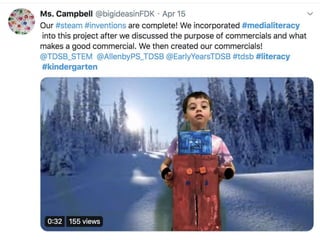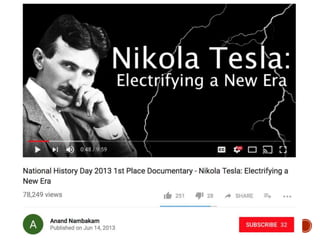Create to Learn: How Digital Media Inquiry Advances Intellectual Curiosity
- 1. Create to Learn How Digital Media Inquiry Advances Intellectual Curiosity Renee Hobbs University of Rhode Island Media Education Lab Twitter: @reneehobbs October 28, 2019 University of Arkansas Fall Public Lecture Series
- 3. Language, Media & Technology Can Create Unreal Realities
- 4. Language, Media & Technology Can Create Unreal Realities From Once Upon a Time to Special Effects, Photoshop, Fake News, Deepfakes and Beyond
- 5. Welcome to the Attention Economy
- 7. MEDIA LITERACY ANALYZE ACCESS ACT REFLECT CREATE Inquiry Reading Search Curation Credibility Analysis Creativity Multimodal Writing Digital Skills Dialogue Collaboration Emotional Response Ethical Reasoning Knowledge of Cultural, Political, Economic & Social Context Citizenship Activism
- 10. We share meaning through symbols that come in many forms
- 11. PEER-TO-PEER FILE SHARING Preview When people create media, they demonstrate literacy & learning competencies in a naturalistic way The rise of algorithmic propaganda requires new knowledge, skills and habits of mind to cope with the complex digital environment of today Analyzing and creating media activates intellectual curiosity & cultivates a spirit of lifelong learning essential for participation in a democratic society
- 12. Out-of-School Remix The Odyssey First Contact Gilded Age Politics
- 13. WRITING READING
- 15. Project Information Literacy Students actively try to reduce the number of choices they have to make in order to get their assignments done. The Citation Project First-year college students who use sources in their writing rarely write about them with much understanding. They don’t summarize sources, they harvest quotes. Nearly half the time, the quotes they use are from the first page of the source. We
- 16. CUT-AND-PASTE CULTURE At least 15% of college students use term paper mills SOURCE: Newton, P. (2018). How common is contract cheating in higher education? A systematic review. Frontiers in Education. https://doi.org/10.3389/feduc.2018.00067
- 21. Kami PDF & Document Markup http://chrome.google.com A Student PDF Annotation @reneehobbs
- 22. A Student Annotates a Video ANT Video Annotation https://ant.umn.edu/
- 28. Developing Research Skills through Multimedia Production
- 33. A majority of students ages 14 - 23 prefer learning from YouTube videos over other activities including in-person group activities, learning apps, games, or reading from printed books. SOURCE: Pearson (2018). Beyond millennials: The next generation of learners. Global Research & Insights and Harris Polling.
- 34. Why do many young people prefer to learn from YouTube videos? What are some benefits, risks and consequences of this? Turn & Talk 4
- 36. Widen the Range of Genres Inspire Creative Collaboration Show Evidence of Learning
- 38. CLOUD-BASED DIGITAL TOOLS Writing KidBlog Google Docs Wikispaces Storybird Animation Animoto Powtoons OSnap Moovly Screencasting Screencastify Screencast-o-Matic Podcasting Anchor FM Video Production YouTube WeVideo Shadow Puppet Kizoa Adobe Spark Coding Scratch Ready Infographics Infogr.am Easel.ly
- 43. Algorithms enable personalization of information, entertainment & persuasive content
- 44. “The art of posing a question must be held of higher value than solving it.” - Georg Cantor, creator of Set Theory (1867)
- 45. Question: Why do the shoes I was looking at on Zappos follow me from one website to another? Question: Why do some FB friends never show up on my News Feed? Question: Why go Google search results seem so different when I use my Grandma’s computer?
- 46. Assignment: Generate a meaningful question. Gather information from 3 or more different types of sources as you answer your question. Aim to develop an informed position on the topic. Then create a short video to share what you learned with a public audience. Search, Research and Create Media
- 47. Coiro, J., Castek, J., & Quinn, D. (2016). Personal inquiry and online research: Connecting learners in ways that matter. The Reading Teacher, 69(5), 483-492.
- 48. Why did the National Rifle Association buy Facebook ads warning people about fake news?
- 51. What are the Implications of Participating in Highly Personalized Media Worlds?
- 56. Hoaxes Parody/Satire ACTIVATE STRONG EMOTIONS ATTACK OPPONENTS SIMPLIFY INFORMATION RESPOND TO AUDIENCE NEEDS KEY FEATURES OF CONTEMPORARY PROPAGANDA
- 57. Hoaxes Parody/Satire ACTIVATE STRONG EMOTIONS ATTACK OPPONENTS SIMPLIFY INFORMATION RESPOND TO AUDIENCE NEEDS KEY FEATURES OF CONTEMPORARY PROPAGANDA
- 59. Teachers can help students analyze contemporary propaganda and understand algorithmic personalization
- 62. LESSON PLANS
- 66. Analyzing Media with the MEDIA LITERACY SMARTPHONE
- 68. multi-perspectival thinking critical analysis cultivates
- 69. PEER-TO-PEER FILE SHARING Review When people create media, they demonstrate literacy & learning competencies in a naturalistic way The rise of algorithmic propaganda requires new knowledge, skills and habits of mind to cope with the complex digital environment of today Analyzing and creating media activates intellectual curiosity & cultivates a spirit of lifelong learning essential for participation in a democratic society
- 70. Analyzing Global Propaganda to Increase Cultural Understanding SOURCE: Hobbs, R., Seyferth-Zapf, C. & Grafe, S. (2018). Using virtual exchange to advance media literacy competencies through analysis of contemporary propaganda, Journal of Media Literacy Education 10(2), 152 – 168.
- 72. Asking critical questions about what you watch, see & read builds a deeper appreciation of the social responsibilities of digital authorship
- 73. Renee Hobbs Director, Media Education Lab Co-Director, Graduate Certificate Program in Digital Literacy Harrington School of Communication & Media University of Rhode Island Email: hobbs@uri.edu Twitter: @reneehobbs LEARN MORE Web: www.mediaeducationlab.com








































































